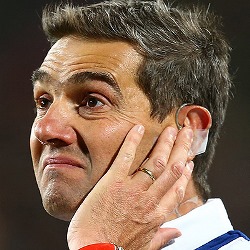
Jérôme Garcès
South Africa’s Springboks fell foul of a law that was introduced for player safety, when they lost 20 / 27 to the New Zealand All Blacks in their Rugby Championship encounter at the weekend.
For the 2nd week in a row the Springboks snatched defeat from the jaws of victory, after All Blacks captain Richie McCaw scored a clever try 6 minutes from time to secure the victory over their arch-rivals at Emirates Airline Park on Saturday.
The defeat came 1 week after the Springboks conceded an even later try, in the 80th minute, to fall 20 / 24 against Australia’s Wallabies in Brisbane.
However, it was the question of why there were uncontested scrums in the final quarter – when the Springboks still had 3 ‘qualified’ front row forwards on the field – that puzzled most observers.
It came at a crucial point in the game and had a material effect on the outcome.
The dominant Springbok scrum, which had already earned a couple of penalties and free kicks in the 1st hour, was reduced to uncontested restarts – after Vincent Koch, who had replaced the injured Jannie du Plessis at halftime, was forced from the field in the 61st minute.
Even though Trevor Nyakane, who can play on both sides of the scrum, took to the field, French referee Jérôme Garcès ruled that there should be uncontested scrums.
Not only did it eliminate one of the Springboks’ strengths, but it came at a crucial time.
SA were leading 20 / 17 and were hot on the attack, with a scrum 5m from the Kiwi line. On top of that the All Blacks were reduced to 14 men, after replacement lock Samuel Whitelock had been sin-binned a minute before for a professional foul – slapping the ball out of the scrumhalf’s hands, mere metres from his own line.
The possibility of a score, even a try, with a full scrum against an underpowered All Blacks set piece was a very real prospect. That would have put the Springboks in a commanding position.
Instead it gave a window of opportunity for the visitors to defend their line without having to worry about the scrum, a chance they grabbed with both hands – not just keeping the Springboks out, but going on to produce the match-winning score, through their captain.
Springbok coach Heyneke Meyer confirmed that the call to go to uncontested scrums was made by the referee, Garcès, and was not what his team would have wanted – given their dominance in the set pieces.
“If 2 tightheads go off you go to uncontested scrums, that is the law,” a frustrated Meyer told a post-match media briefing.
“It was a call by the referee and probably the right call – players always come 1st,” he added.
Asked why, with Nyakane having played on both sides of the front row, the Springboks were not allowed to continue contesting the scrums, Meyer again turned to Law 3.5 – which governs the front row and replacements.
“Yes, Trevor has played there, but the law is there to protect players,” Meyer said, adding: “In other games there aren’t players that can play there and then you go to uncontested scrums – that is the law.
“We scrummed really well, but unfortunately the injuries did not help us.”
Meyer felt that the call and law can’t be faulted, even though the Springboks found themselves on the wrong side of a law that was changed in 2009.
“Previously you only had 2 guys on the bench or 22 in the team. You had to have a guy that could play both.
“Now you have to have 2 specialised loosehead props and 2 specialised tighthead props,” the Springbok coach added.
Law 3.5 – which governs the front row and replacements:
A team must have 6 players who can play in the front row.
b) Prior to the match teams must advise the referee of their front row players and replacements. Each player in the front row and any potential replacements must be suitably trained and experienced.
(c) The replacement of a front row player must come from the suitably trained and experienced players who started the match or from nominated replacements. A player other than a nominated front row player is permitted to play in the front row only when uncontested scrums are being played and there are no available front row replacements.
(g) If a union or match organiser decides to have 23 players nominated for a team there must be sufficient front row players to play at hooker, tighthead prop and loosehead prop who are suitably trained and experienced to ensure that on the 1st occasion that a replacement is required in each front row position, the team can continue to play safely with contested scrums.
(h) If, because of a sending off or injury, a team cannot provide enough suitably trained front row players, the match continues with uncontested scrums.
(m) If there are no further front row replacements available when a front row player leaves the field of play, is sent off or temporarily suspended, uncontested scrums will be ordered. It is not the responsibility of the referee to determine the suitability of trained front row replacements nor their availability, as this is a team responsibility.
rugby365